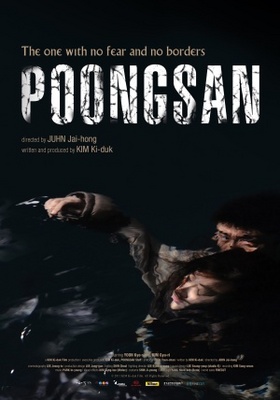THE STUNNING LYRICISM OF AN ORDINARY MAN
THE STUNNING LYRICISM OF AN ORDINARY MAN
By Marybel Gervais
Translated into English by Adam Abouaccar
——————
 Life is rich in emotional experiences and each person goes about it in one’s own way, deciding whether or not to make use of the opportunities that cross one’s path. This is the very essence of every story renowned South Korean writer/director Kim Ki-duk has put to film. He does not limit himself to improbable walks of life, but attempts to analyse human feelings through avenues more representative of his own reality. Korea’s divided states make for a unique national identity almost incomprehensible to non-residents. Kim Ki-duk imbues his latest script for Juhn Jaihong’s Poongsan with his usual lyrical touches and conveys real emotions as only an artist who has mastered his craft can.
Life is rich in emotional experiences and each person goes about it in one’s own way, deciding whether or not to make use of the opportunities that cross one’s path. This is the very essence of every story renowned South Korean writer/director Kim Ki-duk has put to film. He does not limit himself to improbable walks of life, but attempts to analyse human feelings through avenues more representative of his own reality. Korea’s divided states make for a unique national identity almost incomprehensible to non-residents. Kim Ki-duk imbues his latest script for Juhn Jaihong’s Poongsan with his usual lyrical touches and conveys real emotions as only an artist who has mastered his craft can.
Inside this society torn by Korea’s division, families live separately on either side of the most heavily guarded border in the world. Nothing and nobody is supposed to get in or out. One man, blessed with amazing survival skills, decides to put his skills to use. In exchange for money, he delivers messages or personal packages across the border. To keep out of trouble, he conducts all of his transactions in silence. No one knows his name, but certain locals have given him the name “Poongsan” after the brand of his cigarettes he smokes (“Poongsan” also refers to a rare hunting dog breed specific to North Korea). At the special request of a man protected by the authorities of South Korea, Poongsan agrees to bring over In-ok, the man’s wife. Separated for two years since his escape to more forgiving terrain, the man has not stopped thinking about his beloved or the bitter fate that awaits her north of the 38th parallel. In three hours, Poongsan manages to bring In-ok safely to her husband despite a few setbacks. Yet, in their short time together, the two fugitives fall in love, much to the dismay of In-ok’s husband. Despite the fact that Poongsan was under contract with the government on his mission to bring In-ok back, he is blacklisted on his return for conducting trades across the forbidden zone as punishment.
To understand what’s at stake in this story, it is absolutely imperative to understand the immeasurable crisis that has divided Korea for more than 60 years. Though it may be dubbed “the land of the morning calm,” a soundtrack of resonant shouting, gunshots and explosions always greets the sunrise. The views of both sides’ leaders radically differed (and still do). In the North, we find the Democratic People’s Republic of Korea. Upholding a communist approach within a totalitarian regime, they maintain political, economic and military independence while making up a third of Korea’s total population. South of the border, we find what’s commonly referred to as the “demilitarized zone” (DMZ). The remaining two thirds of Korea’s inhabitants live in the Republic of Korea, a place relatively open to Western culture with a democratic regime geared toward capitalism.
After their formal separation in the late 1940s and the War of 1950-1953 that followed, several families are forced to live separated from their loved ones, a terrible blow to many. Furthermore, the lives of northerners are difficult as they live for the most part in poverty. Little can be done about their situation. This is not the case in the South where education is still accessible and general conditions are better. The characters created by Kim Ki-duk in Poongsan are representative of this harsh reality and focus is never put on divulging how the main character acquired his unique skills. His past also remains unaddressed. As a whole, citizens of the north demonstrate an astonishing adaptability and capacity to survive, due in no small part to the newfound aridity of life in North Korea. Lack of money pushes one to resort to one’s strengths without excess. In-ok’s difficulty to forget her old life and to enjoy luxury and attention from her husband is a demonstration of a different sort. Together with the main character’s own story, we observe through his missions other examples of Korea’s social reality. An example of this is an old man on his deathbed who cannot believe that he can see his wife via video before he dies. An explosively poignant moment.
This story could have been written only by a Korean who lived this particular reality. In 1960, Kim Ki-duk was born into a country where the confrontations were already in full swing. He was fortunate to be born in the south where he had access to greater opportunities. Taking full advantage of his fortune, he tried his hand at many different careers, going from farming to the military, to a brief stint in the priesthood before becoming a painter and filmmaker.
His passions and wide range of experiences deeply enrich his scripts. Gracefully, he produces profound emotions in the viewer, aided by images without dialogue. His characters are precious to us not because they represent an ideal we would like to reach in vain, but because they are genuine, touching and unconventional. The mystery revolving around the Poongsan character’s history resembles that of Hee-jin in Kim’s earlier Seom (The Isle, 2000); Kim characterizes both characters with a heavy silence, creating an air about both characters that is all their own. His cinematic universe always involves a love story as a catalyst. It is never black and white and allows the viewer to question moral and social principles. Kim frequently touches upon taboo subjects such as adultery, prostitution (Samaria, 2004) and even incest (Hwal, 2005), but despite the compromising situations in which the protagonists find themselves, they exude sincerity and only instil a sense of fraternal understanding in the viewer. Poongsan recalls Kim’s 2004 film 3-Iron with respect to its dark themes, however pure. Both films’ main characters, in their rare reliance on verbal commentary, commendable lines of work and complex histories with love, seem cut from the same cloth.
The auteur’s signature refines and redefines itself with each particular work he or she produces. Kim Ki-duk always walks the same path, set for a destination that is invisible to the rest of us. He has a formula that pleases him and excites his viewers here in the West. Sadly, he is not as revered in his native country of South Korea. As the saying goes: “No man is a prophet in his own country.” Conversely, it is perhaps because we are Westerners that we are allowed to cherish Kim Ki-duk’s work as much as we do.

 August 9, 2012
August 9, 2012  No Comments
No Comments





